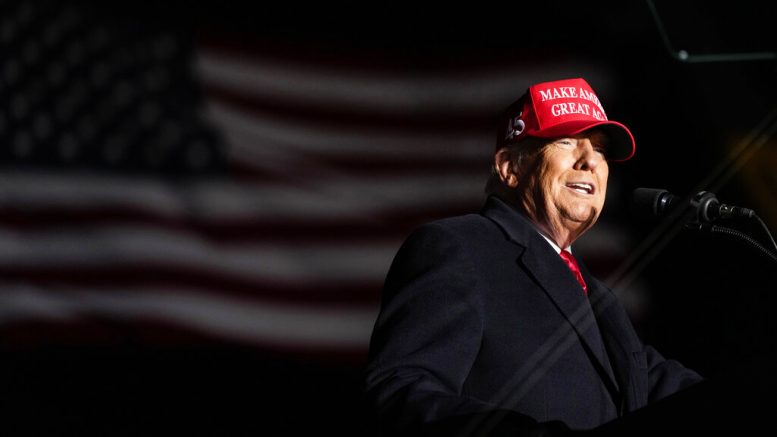CEDAR RAPIDS, Iowa (AP) — Nikki Haley is swinging through Iowa this week fresh off announcing her presidential campaign. Her fellow South Carolinian Republican, Sen. Tim Scott, will also be here as he decides his political future. And former Vice President Mike Pence was just in the state courting influential evangelical Christian activists.
After a slow start, Republican presidential prospects are streaming into the leadoff presidential caucus state. Notably absent from the lineup, at least for now, is former President Donald Trump.
Few of the White House hopefuls face the lofty expectations in Iowa that Trump does. He finished a competitive second to devout social conservative Ted Cruz in 2016, and went on to carry the state twice, by healthy margins, as the Republican presidential nominee in the 2016 and 2020 elections.
“It is genuinely impossible for this guy to try to manage these expectations. They are enormous. They are self-made,” said Luke Martz, a veteran Iowa Republican strategist who helped lead Mitt Romney’s 2012 Iowa caucus campaign. “I don’t see how anyone who is saying ‘I’m the guy’ can come in and even get even a second-place finish.”
Yet, in the three months since he announced his bid for a comeback, Trump has not set foot in Iowa, the first place his claim of party dominance will be tested early next year.
To be sure, Trump has a campaign presence in Iowa. Alex Latcham, who is part of Trump’s national team but is based in the state, has been working on landing a caucus campaign director. But Trump held a kickoff rally on Jan. 28 in South Carolina, where his 2016 primary victory sealed his status as GOP frontrunner. And he squeezed in a speaking spot earlier that day at the annual state GOP meeting in New Hampshire, where he also won the first-in-the-nation primary seven years ago.
Though the caucuses remain nearly a year off, they remain the first event on the calendar, and some Iowa GOP activists have taken notice of Trump’s absence.
“I found that quite interesting,” Gloria Mazza, chairwoman of the Polk County GOP, said of Trump’s New Hampshire and South Carolina stops. “Because Iowa is first in the nation, doesn’t everybody come here first?”
Meanwhile, others are making inroads.
Though Pence is not yet a candidate, his advocacy group Advancing American Values last week launched a campaign to organize opposition to school policies like one in an eastern Iowa district that has become a flashpoint among conservatives.
Pence was in Cedar Rapids on Wednesday rallying opponents of a policy by the nearby Linn-Mar Community School District that’s at issue in a federal lawsuit. The school board last year enacted a measure allowing transgender students to request a gender support plan to begin socially transitioning at school without the permission of their parents.
The issue, an early focus of 2024 Republican presidential prospects, is particularly contentious among Christian conservatives, with whom Pence routinely says he identifies. And at Wednesday’s event at a pizza restaurant — it had the feel of an early caucus campaign stop — Pence illustrated its traction.
“We don’t co-parent with government,” Pence told a cheering audience of more than 100. “We trust parents to protect their children and no one will ever protect America’s children better than their moms and dads.”
Haley has rallies planned in the Des Moines and Cedar Rapids areas on Monday and Tuesday. Meanwhile, Scott is speaking an event at Drake University on Wednesday, part of what aides call a national listening tour aimed at informing his plans, before addressing the annual Polk County Republican fundraiser in suburban Des Moines that evening.
Quietly making inroads is former Arkansas Gov. Asa Hutchinson, who visited Iowa in January, and met last week with legislative Republicans in the Capitol in Des Moines and Republican activists in western Iowa.
Though several would-be candidates including Trump were in Iowa last year campaigning for midterm candidates, these first impressions at the outset of the GOP presidential primary are important. That’s especially true as many in the GOP wait to see whether Florida Gov. Ron DeSantis proceeds with a White House bid.
But as the field of candidates grows in the coming months, Trump still retains a core of Republican support that could be hard to overcome.
In October, 57% of Iowa Republicans said they hoped Trump decided to run in 2024, according to a Des Moines Register/Mediacom Iowa Poll, while 33% said they hoped he would not and 10% said they were not sure.
“Of course, there’s a contingent that will support him regardless,” Iowa Republican national committeeman Steve Scheffler said. “But there’s an increasing number of people who want to kick the tires before making a decision. That’s what gives others an open door.”




































